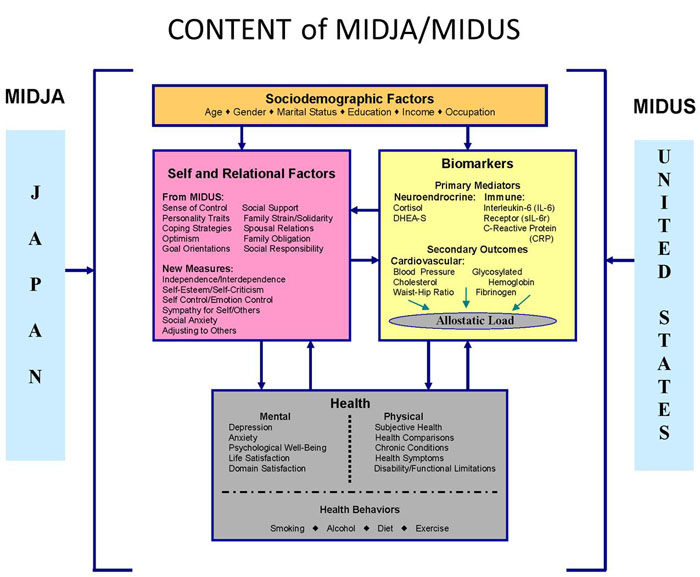
MIDJA (Midlife in Japan)
The MIDJA study is a probability sample of Japanese adults (N = 1,027) aged 30 to 79 from the Tokyo metropolitan area. In 2008, with funding from the National Institute on Aging (NIA), baseline survey data were collected on sociodemographic characteristics (age, gender, marital status, educational status), psychosocial characteristics (e.g., independence/interdependence, personality traits, sense of control, goal orientations, social support, family obligation, social responsibility), mental health (depression, anxiety, well-being, life satisfaction), and physical health (chronic conditions, health symptoms, functional limitations, health behaviors). In 2009-2010 biomarker data was obtained from a subset of these cases. The survey and biomarker measures obtained parallel those in the national longitudinal sample of Americans known as Midlife in the United States or MIDUS. The central objective was to compare the Japanese sample (MIDJA) with the United States sample (MIDUS) to test hypotheses about the role of psychosocial factors in the health (broadly defined) of mid- and later-life adults in Japan and the U.S.
In 2012, with additional support from NIA, a longitudinal follow-up of the MIDJA sample was completed. The data collection for this second wave (N=657) largely repeated the baseline assessments. The central objective was to conduct comparisons of longitudinal data available from the Japanese sample (MIDJA) and the United States sample (MIDUS) to test the hypothesis about the role of psychosocial factors in predicting health changes (including biomarkers) in both cultural contexts. Cultural influences on age differences in health and well-being were also of interest.
MIDJA data are publically available at the Inter-university Consortium for Political and Social Research (ICPSR) as part of the MIDUS collection.
